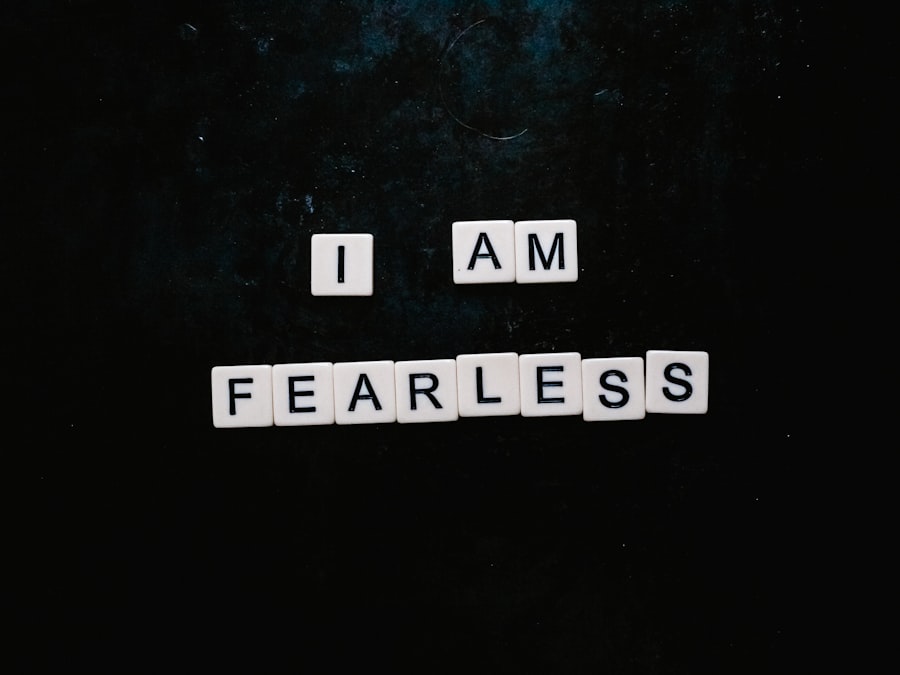Self-doubt is a pervasive feeling that can creep into your mind, often without warning. It manifests as a nagging voice that questions your abilities, decisions, and worth. This internal dialogue can stem from various sources, including past experiences, societal expectations, and comparisons with others.
You may find yourself reflecting on moments when you felt inadequate or when someone else’s words made you question your capabilities. Understanding the roots of self-doubt is crucial in addressing it effectively. The origins of self-doubt can often be traced back to childhood experiences or formative moments in your life.
Perhaps you faced criticism from a teacher or a parent, or maybe you were compared unfavorably to peers. These experiences can create a lasting impact, leading you to internalize negative beliefs about yourself.
Recognizing these influences is the first step toward dismantling the barriers they create in your mind.
Key Takeaways
- Self-doubt is a common experience that stems from various sources such as past experiences, societal pressures, and comparison to others.
- Self-doubt can have a significant impact on mental health, relationships, and overall well-being, leading to feelings of inadequacy and fear of failure.
- Challenging negative self-talk and limiting beliefs is essential in overcoming self-doubt and building self-confidence.
- Developing a growth mindset can help individuals embrace challenges, learn from failures, and see setbacks as opportunities for growth.
- Setting realistic goals and expectations for oneself is crucial in managing self-doubt and avoiding unnecessary pressure and disappointment.
Recognizing the Impact of Self-Doubt on Your Life and Well-being
Self-doubt can have a profound effect on various aspects of your life, from personal relationships to professional endeavors. When you allow self-doubt to take hold, it can lead to missed opportunities and hinder your ability to pursue your goals. You might find yourself hesitating to speak up in meetings or avoiding social situations altogether due to fear of judgment.
This avoidance can create a cycle of isolation and reinforce the very doubts that hold you back. Moreover, self-doubt can take a toll on your mental health. It often leads to feelings of anxiety and depression, as you grapple with the constant fear of failure or inadequacy.
You may experience a lack of motivation or a sense of hopelessness, which can further perpetuate the cycle of self-doubt. Acknowledging the impact of these feelings on your overall well-being is essential for initiating change and reclaiming control over your life.
Challenging Negative Self-Talk and Limiting Beliefs

One of the most effective ways to combat self-doubt is by challenging the negative self-talk that fuels it. You may find yourself engaging in a harsh internal dialogue that criticizes your every move. To counter this, start by identifying these negative thoughts and questioning their validity.
Are they based on facts, or are they simply reflections of your insecurities? By reframing these thoughts into more positive affirmations, you can begin to shift your mindset. Additionally, it’s important to recognize the limiting beliefs that may be holding you back.
These beliefs often manifest as “I can’t” or “I’m not good enough” statements that prevent you from taking action. To challenge these beliefs, consider evidence from your past that contradicts them. Reflect on times when you succeeded despite feeling uncertain or when you received positive feedback from others.
By gathering this evidence, you can create a more balanced perspective that empowers you to move forward.
Developing a Growth Mindset to Overcome Self-Doubt
| Metrics | Results |
|---|---|
| Number of self-doubt thoughts | 20 |
| Number of growth mindset practices implemented | 5 |
| Self-doubt impact on decision making | High |
| Self-doubt impact on productivity | Low |
| Self-doubt impact on confidence | Medium |
Adopting a growth mindset is a powerful strategy for overcoming self-doubt. This concept, popularized by psychologist Carol Dweck, emphasizes the belief that abilities and intelligence can be developed through dedication and hard work. When you embrace a growth mindset, you begin to view challenges as opportunities for growth rather than threats to your self-worth.
This shift in perspective can significantly reduce feelings of self-doubt. To cultivate a growth mindset, start by reframing failures as learning experiences. Instead of viewing setbacks as confirmations of your inadequacy, see them as valuable lessons that contribute to your personal development.
Celebrate your efforts and progress, regardless of the outcome. By focusing on the journey rather than solely on results, you can foster resilience and diminish the power of self-doubt in your life.
Setting Realistic Goals and Expectations for Yourself
Setting realistic goals is essential in combating self-doubt and building confidence. When you establish achievable objectives, you create a roadmap for success that allows you to track your progress over time. Start by breaking larger goals into smaller, manageable steps.
This approach not only makes the process less overwhelming but also provides opportunities for small victories along the way. As you set these goals, be mindful of your expectations. It’s easy to fall into the trap of perfectionism, where you believe that anything less than flawless is unacceptable.
Instead, aim for progress rather than perfection. Acknowledge that mistakes are part of the learning process and that each step forward is a testament to your growth. By setting realistic expectations for yourself, you can reduce the pressure that often accompanies self-doubt.
Seeking Support and Guidance from Trusted Individuals

You don’t have to navigate self-doubt alone; seeking support from trusted individuals can be incredibly beneficial. Whether it’s friends, family members, or mentors, surrounding yourself with people who uplift and encourage you can help counteract negative thoughts. Share your feelings of self-doubt with them; often, they can provide valuable perspectives that challenge your internal narrative.
Additionally, consider seeking guidance from professionals such as therapists or coaches who specialize in personal development. They can offer tools and strategies tailored to your unique situation, helping you work through self-doubt in a constructive manner. Remember that reaching out for support is not a sign of weakness; rather, it demonstrates strength and a commitment to personal growth.
Practicing Self-Compassion and Forgiveness
Practicing self-compassion is vital in overcoming self-doubt and fostering a healthier relationship with yourself. Instead of being overly critical when you make mistakes or face challenges, treat yourself with kindness and understanding. Acknowledge that everyone experiences setbacks and that it’s okay to be imperfect.
By cultivating self-compassion, you create a nurturing environment where growth can flourish. Forgiveness also plays a crucial role in this process. You may carry guilt or shame from past experiences that contribute to your self-doubt.
Allow yourself to let go of these burdens by recognizing that everyone makes mistakes and deserves forgiveness—yourself included. Embracing this mindset can free you from the shackles of past failures and empower you to move forward with renewed confidence.
Cultivating Self-Awareness and Mindfulness to Manage Insecurities
Self-awareness is key in managing insecurities and reducing self-doubt. Take time to reflect on your thoughts and feelings; journaling can be an effective tool for this purpose. By documenting your experiences and emotions, you gain insight into patterns of thinking that contribute to self-doubt.
This awareness allows you to identify triggers and develop strategies for addressing them. Incorporating mindfulness practices into your daily routine can also enhance self-awareness. Mindfulness encourages you to stay present in the moment without judgment, helping you observe your thoughts without becoming overwhelmed by them.
Techniques such as meditation or deep breathing exercises can ground you during moments of doubt, allowing you to respond with clarity rather than react impulsively.
Building Resilience and Coping Skills to Navigate Setbacks
Resilience is an essential quality for overcoming self-doubt and navigating life’s challenges.
Start by identifying healthy coping mechanisms that work for you—whether it’s engaging in physical activity, practicing mindfulness, or seeking social support.
Additionally, embrace the idea that setbacks are not failures but rather opportunities for growth. When faced with challenges, remind yourself of past instances where you overcame difficulties and emerged stronger on the other side. This perspective shift can help fortify your resilience and diminish the grip of self-doubt during tough times.
Embracing Vulnerability and Taking Risks to Build Confidence
Embracing vulnerability is a powerful way to build confidence and combat self-doubt. It involves acknowledging your fears and insecurities while still choosing to take action despite them. When you allow yourself to be vulnerable—whether by sharing your thoughts with others or stepping outside your comfort zone—you open yourself up to new experiences that foster growth.
Taking risks is an integral part of this process; it’s through these experiences that you learn more about yourself and what you’re capable of achieving. Start small by setting challenges that push your boundaries just enough to feel uncomfortable but not overwhelmed. Each time you take a risk and succeed—or even fail—you build confidence in your ability to handle whatever comes your way.
Celebrating Your Achievements and Progress in Overcoming Self-Doubt
Finally, it’s essential to celebrate your achievements and progress as you work through self-doubt. Acknowledging even the smallest victories reinforces positive behavior and helps counteract negative thoughts. Create a habit of reflecting on what you’ve accomplished regularly; this could be through journaling or simply taking time each week to recognize how far you’ve come.
Celebration doesn’t have to be grand; it can be as simple as treating yourself to something special or sharing your successes with friends who support you. By celebrating your journey toward overcoming self-doubt, you reinforce the belief that growth is possible and remind yourself of your inherent worthiness—an essential step in building lasting confidence.
In exploring the theme of self-doubt, it’s essential to consider strategies for overcoming this common psychological barrier. An insightful article on this topic can be found on Productive Patty’s website. The article delves into practical techniques for boosting self-confidence and enhancing productivity, offering valuable advice for anyone struggling with self-doubt. For more detailed guidance, you can read the full article by visiting Productive Patty.
FAQs
What is self-doubt?
Self-doubt is a feeling of uncertainty or lack of confidence in oneself and one’s abilities. It can manifest as questioning one’s decisions, skills, or worth.
What are the causes of self-doubt?
Self-doubt can be caused by various factors such as past failures, negative experiences, comparison to others, fear of rejection, perfectionism, and low self-esteem.
How does self-doubt affect a person?
Self-doubt can lead to feelings of anxiety, stress, and low self-esteem. It can also hinder personal and professional growth, leading to missed opportunities and decreased motivation.
What are some strategies for overcoming self-doubt?
Strategies for overcoming self-doubt include practicing self-compassion, challenging negative thoughts, setting realistic goals, seeking support from others, and focusing on personal strengths and achievements.
When should someone seek professional help for self-doubt?
If self-doubt significantly impacts a person’s daily life, relationships, or mental well-being, it may be beneficial to seek help from a mental health professional such as a therapist or counselor.




